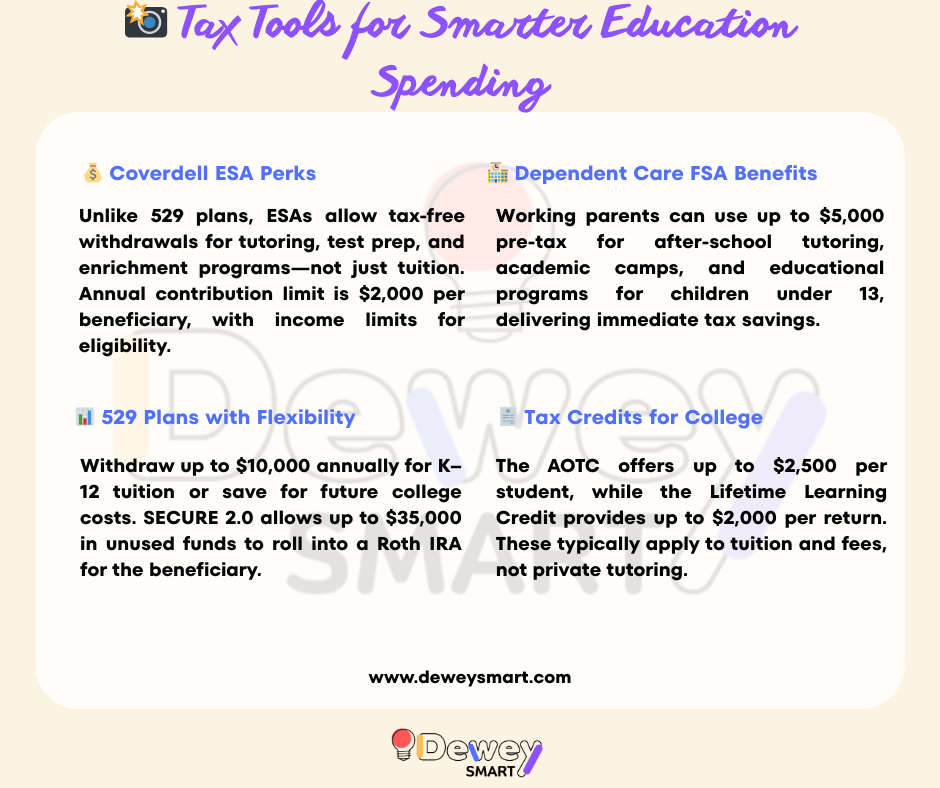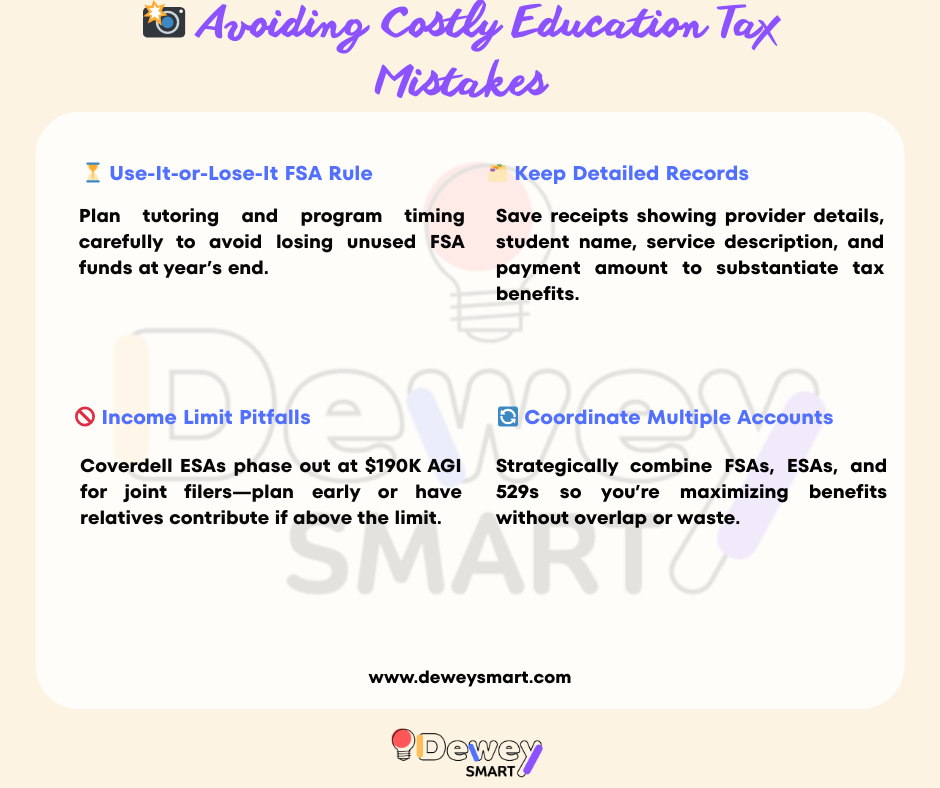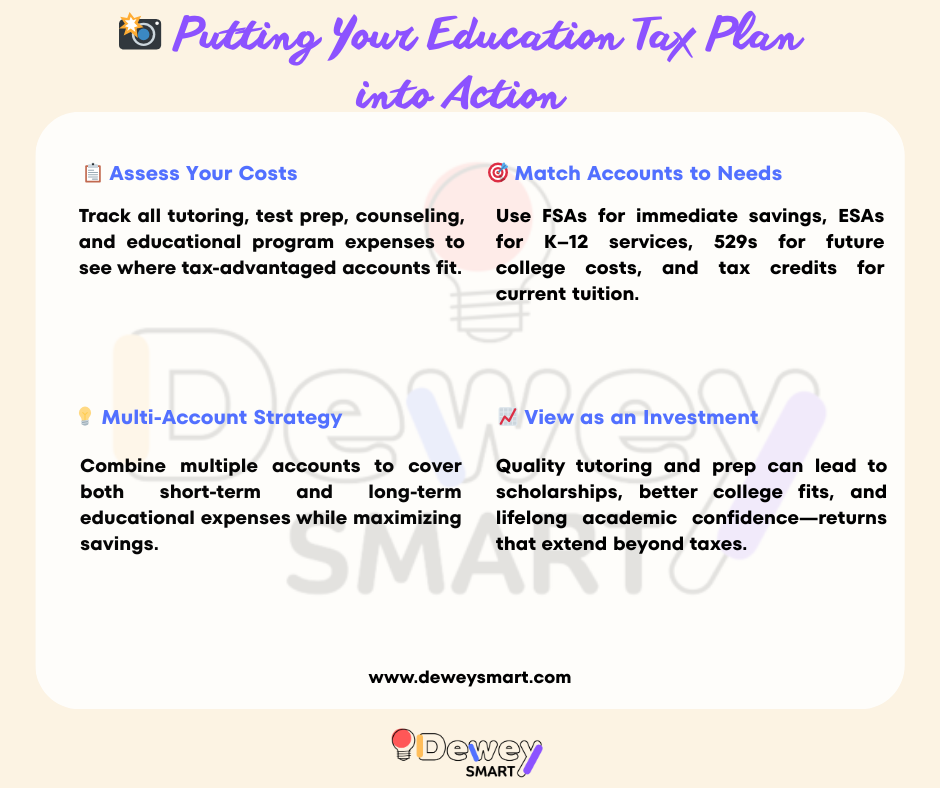
Discover 2025 tax advantages for tutoring, test prep, and college counseling. Learn about 529 plans, FSAs, and educational tax credits to reduce costs while boosting academic success.
Founded in a Columbia University dorm room, Dewey Smart is a comprehensive educational consulting company that connects high school students with 50+ current Ivy League and top university tutors and counselors. Their expert team provides personalized support to help students excel academically and navigate today's competitive college admissions process.
Ready to make a strategic investment in your child's academic future? Schedule a free consultation with Dewey Smart today to learn how our services can maximize both educational outcomes and your tax planning strategy.
As college costs continue to climb and academic competition intensifies, savvy parents are discovering that investing in quality educational services doesn't have to break the bank. In fact, with proper tax planning, families can significantly reduce the cost of tutoring, SAT prep, college counseling, and other educational services while setting their children up for academic success.
The key lies in understanding the various tax-advantaged accounts and deductions available for educational expenses in 2025. From Coverdell Education Savings Accounts to Dependent Care FSAs, there are multiple strategies that can help you stretch your education dollar further while building a foundation for your child's future.
While many families focus on 529 plans, Coverdell ESAs offer unique advantages for funding educational services during the elementary and secondary school years. Unlike 529 plans, which limit K-12 distributions to $10,000 annually for tuition only, Coverdell ESAs allow tax-free withdrawals for a broader range of qualified educational expenses.
What qualifies for Coverdell ESA distributions:
2025 Coverdell ESA Key Facts:
Real-world example: The Johnson family contributes $2,000 annually to their daughter's Coverdell ESA. Over five years, with modest investment growth, they've accumulated $11,500. They can use these funds tax-free for SAT prep courses, college counseling services, and tutoring throughout high school, effectively reducing their out-of-pocket educational expenses.
If you're a working parent paying for after-school tutoring, academic support programs, or educational camps, a Dependent Care FSA can provide immediate tax relief.
2025 Dependent Care FSA Highlights:
Qualified expenses include:
Tax savings calculation: A family in the 24% federal tax bracket saving $5,000 in a Dependent Care FSA saves $1,200 in federal taxes, plus additional savings on state taxes and FICA taxes where applicable.

While 529 plans are primarily designed for college expenses, they can complement your educational tax strategy in several ways:
For current K-12 expenses:
For college preparation:
SECURE 2.0 Act Advantage: One of the most significant recent developments is the ability to roll over unused 529 plan funds into a Roth IRA without taxes or penalties. This provision from the SECURE 2.0 Act provides families with additional flexibility:
This feature significantly reduces the risk of "overfunding" a 529 plan, as excess funds can now be converted into retirement savings for your child.
American Opportunity Tax Credit (AOTC):
Lifetime Learning Credit:
Important note: These credits apply to qualified tuition and fees. Private tutoring and test prep services typically don't qualify unless provided by an eligible educational institution.
New York offers additional state tax benefits for 529 plan contributions, with deductions up to $10,000 per beneficiary. Consider maximizing these benefits while using other accounts for immediate educational service needs.
While California doesn't offer state tax deductions for 529 contributions, the tax-free growth and federal benefits still make these accounts valuable. Focus on Coverdell ESAs and FSAs for immediate tax relief on educational services.
Texas residents benefit from no state income tax, making federal tax strategies even more impactful. Maximizing federal deductions and credits becomes the primary focus.
Oregon offers a distinctive advantage with its income tax credit for contributions to the Oregon College Savings Plan. Since 2020, Oregon replaced traditional 529 plan deductions with a more valuable tax credit system:

FSAs typically require you to use funds within the plan year or lose them. Plan your educational service expenses carefully and consider timing major tutoring or prep programs strategically.
Educational tax benefits require detailed documentation. Keep receipts showing:
Coverdell ESAs have strict income limits that can eliminate contribution eligibility. Plan contributions early in the year and consider having grandparents or other family members contribute if your income exceeds limits.
Families often have multiple educational savings vehicles. Ensure you're optimizing the use of each account type based on current needs and tax implications.
Create a detailed budget of your family's educational service costs:
Consider a multi-account approach:

When evaluating educational services like professional tutoring, SAT prep, or college counseling, remember that these investments often provide returns that extend far beyond test scores. Consider:
Quality educational services from providers like Dewey Smart represent not just an expense, but a strategic investment in your child's future – one that can be optimized through smart tax planning.
The most successful families understand that investing in their children's education doesn't have to be financially overwhelming. By strategically utilizing tax-advantaged accounts and understanding available deductions and credits, you can significantly reduce the cost of essential educational services while positioning your child for academic success.
Whether you're considering professional tutoring, comprehensive test prep, or expert college counseling services, the combination of quality educational investment and smart tax planning creates a powerful formula for both academic and financial success.
Remember, the best educational investment is one that not only improves your child's academic outcomes but also fits sustainably within your family's financial plan. With proper tax strategy, that investment becomes even more valuable.
Ready to optimize your educational investments? Dewey Smart's comprehensive college admissions counseling, test prep, and academic tutoring services represent the kind of strategic educational investment that smart families combine with tax-advantaged planning. Our expert team helps students achieve their academic goals while parents maximize their education dollars through proper tax planning.
Contact Dewey Smart today to learn how our services can be part of your family's smart educational and financial strategy.
